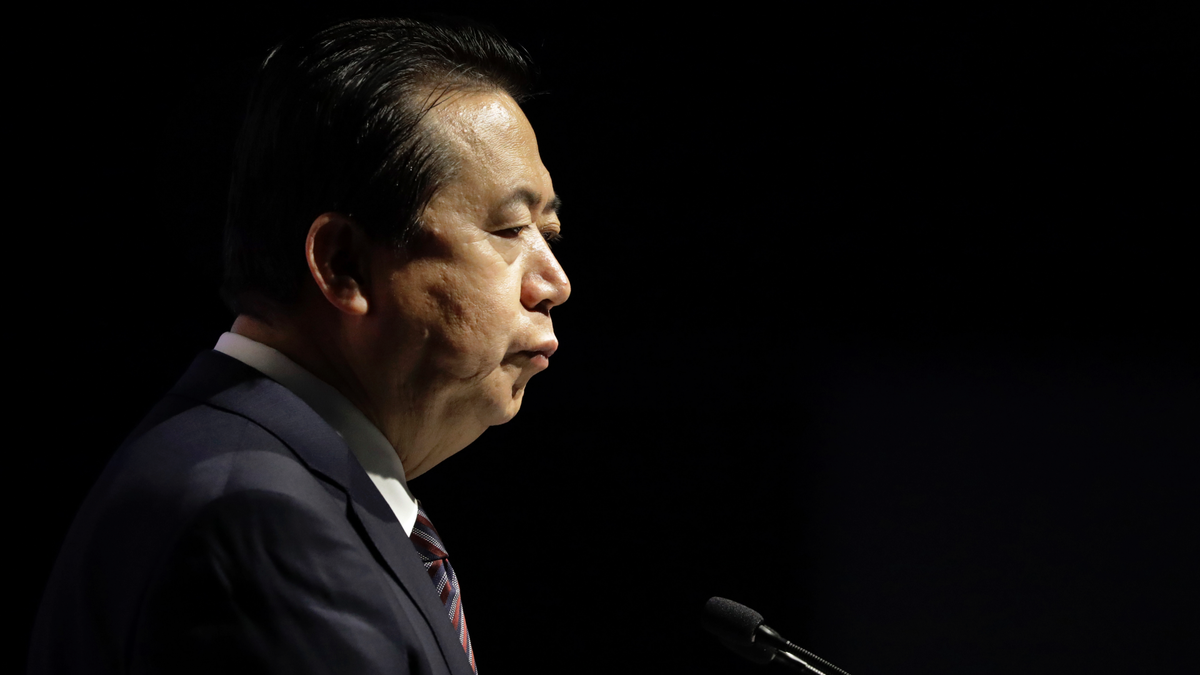
FILE - In this July 4, 2017 file photo, Interpol President, Meng Hongwei, delivers his opening address at the Interpol World congress in Singapore. A French judicial official says Friday Oct.5, 2018 the president of Interpol has been reported missing after traveling to China. (AP Photo/Wong Maye-E, File)
BEIJING – The missing president of Interpol, Meng Hongwei, has deep ties to China's sprawling domestic security sector, including a lengthy term as vice minister of public security.
Here are some facts about Meng that might have a bearing on his disappearance during a trip to China.
___
WHAT'S HIS BACKGROUND?
Meng's official biography says he was born in 1953 in the northeastern city of Harbin and graduated with a degree in law from prestigious Peking University. He appears to have moved swiftly into the central government in Beijing, acting as an assistant to the public security minister — China's top cop — as well as head of the transportation department. By 2004, he was a vice minister of public security and that same year became head of Interpol's China branch. He was head or deputy head of branches of the coast guard, and in 2016, he was elected Interpol's president.
___
WHAT ARE HIS DUTIES?
Meng's position as Interpol's president is less hands-on than the organization's secretary general, but he works out of its headquarters in Lyon, France, and has made frequent appearances at crime prevention gatherings. According to Interpol's website, in May he delivered a speech in Ireland in which he discussed the changing face of global crime and the need for Interpol to remain above political considerations. "First, it is obvious that globalization, virtualization and high-tech are the new features of crime. Second, crime has become a global security issue. This was not the case in the past," Meng said. He also referred to the global governance structure as "entering a period of change," saying that, "Under such circumstances, I hope that we will adhere to our neutral and apolitical positions on major issues." Despite such statements, rights groups expressed concern that Meng would help further China's agenda of attacking the government's political foes while neutralizing criticism.
___
WHY DID HE DISAPPEAR?
Meng's various jobs put him in close contact with Chinese leaders in the security establishment, a sector long synonymous with corruption, opacity and human rights abuses. While there are no public allegations against him, Meng, a member of the ruling Communist Party, likely worked closely with former security chief and Politburo Standing Committee member Zhou Yongkang, who is now serving a life sentence for corruption. Zhou was one of the highest-profile figures caught up in President Xi Jinping's sprawling campaign against graft at all levels of government, military and state industry. Officials under suspicion often disappear into the party's investigatory body, which can hold them for months without releasing information or providing them with legal counsel.
___
WERE THERE ANY INDICATIONS SOMETHING WOULD HAPPEN?
Xi has been seeking the return of officials and businesspeople accused of fraud and corruption from abroad, sometimes with the help of Interpol in an arrangement human rights advocates say is prone to abuse. Since Meng continued to hold positions in the security establishment concurrently with his role as Interpol president, that may have placed him under additional pressure. Reports from April said Meng had been relieved of his position as a member of the party committee at the Ministry of Public Security, with no explanation given. That could have been a sign of his declining political fortunes, or simply a prelude to his impending retirement, given that, at 64, he was approaching the age when officials generally begin stepping down from their positions.







































